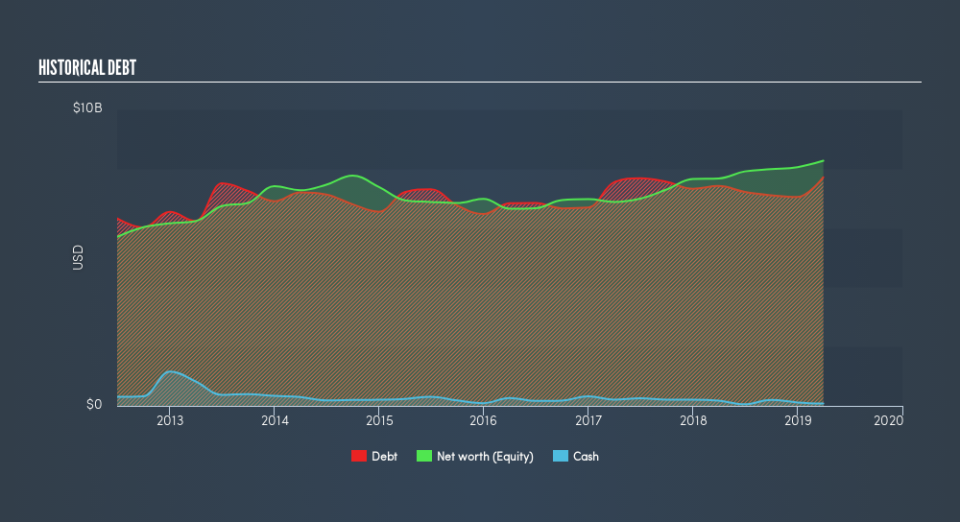Is Ecolab Inc. (NYSE:ECL) A Financially Sound Company?

Want to participate in a short research study? Help shape the future of investing tools and you could win a $250 gift card!
Investors seeking to preserve capital in a volatile environment might consider large-cap stocks such as Ecolab Inc. (NYSE:ECL) a safer option. Doing business globally, large caps tend to have diversified revenue streams and attractive capital returns, making them desirable investments for risk-averse portfolios. However, the key to extending previous success is in the health of the company’s financials. Today we will look at Ecolab’s financial liquidity and debt levels, which are strong indicators for whether the company can weather economic downturns or fund strategic acquisitions for future growth. Note that this information is centred entirely on financial health and is a high-level overview, so I encourage you to look further into ECL here.
See our latest analysis for Ecolab
Does ECL Produce Much Cash Relative To Its Debt?
ECL's debt level has been constant at around US$7.7b over the previous year including long-term debt. At this current level of debt, ECL currently has US$79m remaining in cash and short-term investments , ready to be used for running the business. On top of this, ECL has generated cash from operations of US$2.2b in the last twelve months, leading to an operating cash to total debt ratio of 28%, signalling that ECL’s current level of operating cash is high enough to cover debt.
Does ECL’s liquid assets cover its short-term commitments?
With current liabilities at US$4.2b, it appears that the company has maintained a safe level of current assets to meet its obligations, with the current ratio last standing at 1.14x. The current ratio is the number you get when you divide current assets by current liabilities. For Chemicals companies, this ratio is within a sensible range as there's enough of a cash buffer without holding too much capital in low return investments.
Can ECL service its debt comfortably?
With a debt-to-equity ratio of 93%, ECL can be considered as an above-average leveraged company. This isn’t surprising for large-caps, as equity can often be more expensive to issue than debt, plus interest payments are tax deductible. Accordingly, large companies often have an advantage over small-caps through lower cost of capital due to cheaper financing. No matter how high the company’s debt, if it can easily cover the interest payments, it’s considered to be efficient with its use of excess leverage. A company generating earnings after interest and tax at least three times its net interest payments is considered financially sound. In ECL's case, the ratio of 10.22x suggests that interest is amply covered. High interest coverage is seen as a responsible and safe practice, which highlights why most investors believe large-caps such as ECL is a safe investment.
Next Steps:
Although ECL’s debt level is towards the higher end of the spectrum, its cash flow coverage seems adequate to meet obligations which means its debt is being efficiently utilised. Since there is also no concerns around ECL's liquidity needs, this may be its optimal capital structure for the time being. I admit this is a fairly basic analysis for ECL's financial health. Other important fundamentals need to be considered alongside. I recommend you continue to research Ecolab to get a more holistic view of the large-cap by looking at:
Future Outlook: What are well-informed industry analysts predicting for ECL’s future growth? Take a look at our free research report of analyst consensus for ECL’s outlook.
Valuation: What is ECL worth today? Is the stock undervalued, even when its growth outlook is factored into its intrinsic value? The intrinsic value infographic in our free research report helps visualize whether ECL is currently mispriced by the market.
Other High-Performing Stocks: Are there other stocks that provide better prospects with proven track records? Explore our free list of these great stocks here.
We aim to bring you long-term focused research analysis driven by fundamental data. Note that our analysis may not factor in the latest price-sensitive company announcements or qualitative material.
If you spot an error that warrants correction, please contact the editor at editorial-team@simplywallst.com. This article by Simply Wall St is general in nature. It does not constitute a recommendation to buy or sell any stock, and does not take account of your objectives, or your financial situation. Simply Wall St has no position in the stocks mentioned. Thank you for reading.

